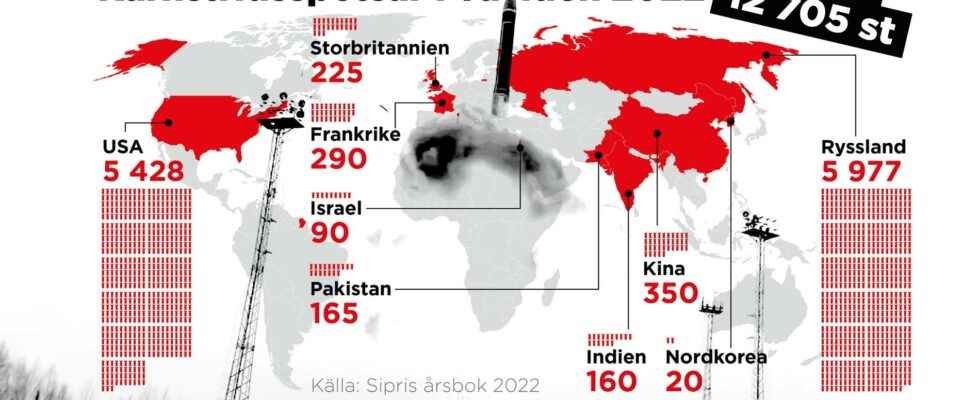full screen
Next
Nine countries have nuclear weapons: the United States, Russia, the United Kingdom, France, China, India, Pakistan, Israel and North Korea.
1 of 2Photo: Johan Hallnäs / TT
The world’s nuclear stockpile has been declining since the end of the Cold War, but there are signs that the downturn is coming to a halt, a recent report shows.
In the next few years, the world can expect the trend to reverse and that nuclear weapons will increase again, predicts the peace research institute Sipri.
The number of nuclear warheads in the world continues to decline, mainly as a result of both Russia and the United States dismantling warheads in 2021 that have been taken out of service before.
However, despite some progress in disarmament, developments appear to be reversing.
“Although we have seen some significant progress in the reduction and disarmament of nuclear weapons over the past year, the risk of nuclear weapons being used is higher now than ever since the Cold War,” said Dan Smith, director of the International Peace Research Institute Sipris in a press release.
Modernization initiatives
Both Russia and the United States, which together account for 90 percent of the world’s nuclear weapons, have embarked on major efforts to modernize and replace their nuclear warheads, production facilities and delivery systems.
The world’s other seven nuclear weapons states are either developing or deploying new weapons systems, or have announced plans to do so. China is modernizing and expanding its nuclear arsenal, and India and Pakistan also appear to be expanding their nuclear arsenals, according to the report.
The UK has also announced plans to increase its holdings.
“If the nuclear weapons states do not take immediate and concrete disarmament measures, the world’s stockpile of nuclear warheads may soon begin to increase for the first time since the Cold War,” said Matt Korda, a researcher associated with Sipri’s weapons of mass destruction program, in the press release.
Sipri points out in its yearbook that access to reliable information on nuclear weapons is low, even though some countries share some information.
“Can not be won”
In January this year, the permanent members of the UN Security Council jointly promised to prevent the proliferation of nuclear weapons. All five – France, China, Russia, Britain and the United States – are nuclear nations.
“A nuclear war cannot be won and must never be fought,” they said in a joint statement. Russia said after the statement that the hope was that it would reduce global tensions.
In 2021, the countries of the world spent more money on military spending for the seventh year in a row. The sum amounted to 2,113 billion US dollars, just over 20,000 billion Swedish kronor. This is the first time that the total cost exceeds $ 2,000 billion. Expenditure increased by 0.7 per cent in 2021 compared with the previous year, and by 12 per cent compared with 2012, according to Sipri’s report.
The sum is 2.2 percent of the world’s GDP, or the equivalent of more than SEK 2,600 per person.
Facts
Sipri
Stockholm International Peace Research Institute (Sipri) is an independent international research institute that researches security, conflict and peace. Its task is to study armed conflict, military spending, arms trade, disarmament and armaments control.
Sipri, which is based in Solna north of Stockholm, was founded in 1966 and shares facts, analyzes and recommendations based on open sources to the media, researchers, decision-makers and the general public.
Sipri is financed for the most part by the Swedish state.
Former Prime Minister Stefan Löfven took office as chairman of Sipri on 1 June, succeeding Jan Eliasson.
Source: Sipri
Read more
